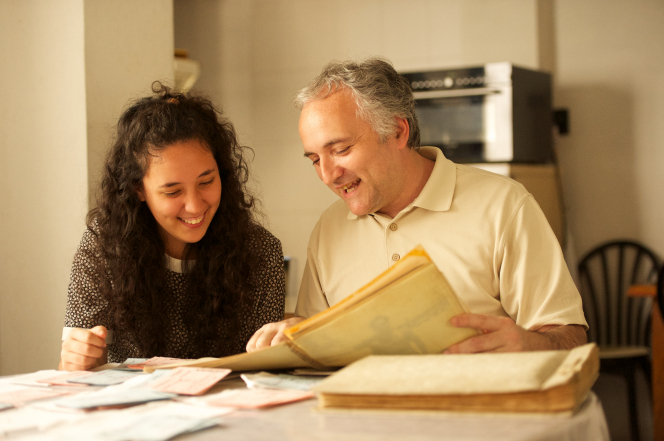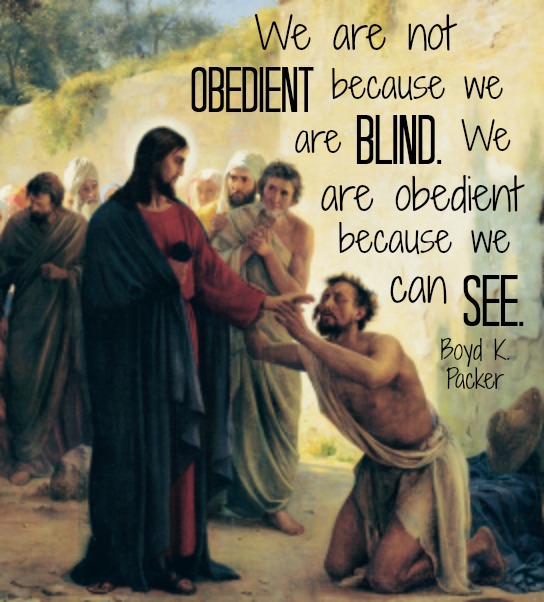In The Church of Jesus Christ of Latter-day Saints, the prophets have taught that children are not accountable before God for their actions until the age of 8. Of this time, President Ezra Taft Benson said:
When the Lord declared that “power is not given unto Satan to tempt little children, until they begin to become accountable,” He revealed that this period of childhood and unaccountability was given to children so that “great things may be required at the hand of their fathers.” (See Doctrine & Covenants 29:47–48.)
“That great things may be required at the hand of their fathers”! What confidence the Lord has in fathers, and what a responsibility He has placed on fathers! Great things are required of fathers today.
And there are great fathers who are living up to their responsibilities. In middle school, I had a friend who was a pastor’s daughter. She took this very seriously and tried to always choose the right not only for herself, but to honor her father. I was always impressed that she thought so highly of her dad that she didn’t want to disappoint him. The faith of her father was very important to her. His unwavering faith in God helped to shape hers. This has always illustrated the great impact that the faith of a father has on his children. It also reminds me how the faith of my father has helped to shape my own beliefs.
An Example of the Believers
One of the things that I have always loved about my father is that he lives what he believes. In the New Testament, the ancient Apostle Paul counseled Timothy:
… Be thou an example of the believers, in word, in conversation, in charity, in spirit, in faith, in purity. (1 Timothy 4:12)
This scripture reminds me of my dad. Much of what I learned from my father was through his example. President James E. Faust said:
… Noble fatherhood gives us a glimpse of the divine attributes of our Father in Heaven. A father should be many things. He should magnify his priesthood and be an example of righteousness. In companionship with his wife, he should be the source of stability and strength for the whole family. He should be the protector and the provider and the champion of the members of his family. Much of his love for his children should flow from his example of love, concern, and fidelity for their mother. By his uncompromising example he should instill character into his children.
My dad set an uncompromising example for his children. He was the first to admit his mistakes and was open and honest in all that he did. He wasn’t perfect, but he tried his best to set a pattern of righteous living and generous service for his kids.
Love for Family
Growing up there were two things that I knew—my mom loved being a mother, and my dad loved being a father. In speaking of defending The Family: A Proclamation to the World, Sister Bonnie L. Oscarson said:
The next principle which calls for our defending voices is elevating the divine roles of mothers and fathers. We eagerly teach our children to aim high in this life. We want to make sure that our daughters know that they have the potential to achieve and be whatever they can imagine. We hope they will love learning, be educated, talented, and maybe even become the next Marie Curie….
Do we also teach our sons and daughters there is no greater honor, no more elevated title, and no more important role in this life than that of mother or father?
As a grown woman with a family of my own, I can say that my mom and dad taught us all of these things. They encouraged us to attend college and receive an education. They taught us to aim high but to remember that family must always come first. They showed this through their words and their deeds. When we were little, my dad would give us airplane rides and basically let us use him as a human jungle gym. As we grew older, he was at every concert, sporting event and award ceremony that we had. My parents had 8 children, and my dad made each one feel loved and special. We never felt like a burden but always felt like a blessing.
Elder Larry M. Gibson said:
Fathers, I am sure you have heard the saying “Preach the gospel at all times, and when necessary use words” (attributed to Francis of Assisi). Every day you are teaching your children what it means to be a father. You are laying a foundation for the next generation. Your sons will learn how to be husbands and fathers by observing the way you fulfill these roles.
One of the things that my dad taught was love and respect for each of my siblings. He would not tolerate his children disrespecting my mom or each other. He and my mother cultivated the pattern that President Benson presented on how to be a successful family. President Benson said:
Successful families have love and respect for each family member. Family members know they are loved and appreciated. Children feel they are loved by their parents. Thus, they are secure and self-assured.
Strong families cultivate an attribute of effective communication. They talk out their problems, make plans together, and cooperate toward common objectives. Family home evening and family councils are practiced and used as effective tools toward this end.
Fathers and mothers in strong families stay close to their children. They talk. Some fathers formally interview each child, others do so informally, and others take occasion to regularly spend time alone with each child.
Every family has problems and challenges. But successful families try to work together toward solutions instead of resorting to criticism and contention. They pray for each other, discuss, and give encouragement. Occasionally these families fast together in support of one of the family members.
Strong families support each other.
My father’s teaching of this was so powerful that we continue to this day helping each other whenever possible. We love and support one another across the miles that separate us. And we still love to visit with each other as often as we can.
The Power of Scripture Study
My father taught us by example the importance of scripture study. Every morning he would get us up at 5 a.m. to read the Book of Mormon: Another Testament of Jesus Christ as a family. And then he would read his scriptures for his personal study. He would rotate through all four scriptures in the Latter-day Saint canon—the Old and New Testaments, the Book of Mormon, the Doctrine and Covenants, and the Pearl of Great Price. As soon as he finished the books, he would start all over again. He didn’t read his scriptures out of obligation, but out of love for them. He loved all of the stories and would tell us about them. Elder Richard G. Scott said:
Scriptures are like packets of light that illuminate our minds and give place to guidance and inspiration from on high. They can become the key to open the channel to communion with our Father in Heaven and His Beloved Son, Jesus Christ. …
Scriptures can communicate different meanings at different times in our life, according to our needs. A scripture that we may have read many times can take on nuances of meaning that are refreshing and insightful when we face a new challenge in life.
This was true for my dad. But he didn’t keep these insights to himself, he shared them with us. And as he shared his love of the scriptures with me, I too gained a love and respect for the scriptures that continues as I read them.
One of the lessons that my dad taught me through the scriptures was the power of prayer. In the Book of Mormon, a prophet named Alma had a wayward son, Alma the Younger. Alma the son was visited by an angel, who told him:
Behold, the Lord hath heard the prayers of his people, and also the prayers of his servant, Alma, who is thy father; for he has prayed with much faith concerning thee that thou mightest be brought to the knowledge of the truth; therefore, for this purpose have I come to convince thee of the power and authority of God, that the prayers of his servants might be answered according to their faith. (Mosiah 27:14)
My dad took comfort in the fact that the Lord heard the prayers of Alma the father—and my dad knew the Lord would hear his prayers in behalf of his children, too. This was just one of many lessons that my dad taught me through his love for and study of the scriptures.
Love of Learning
My father loved to learn—a love that he inherited from his father. My grandfather didn’t have the opportunity to attend college in his youth, so he read as many books on as many subjects as he could. My grandfather read for the love of reading and the love of learning, and so did my dad. And as my dad discovered new things, he would—and still does—excitedly tell us about them.
Through their example, my father and grandfather taught the importance of learning—which is an essential aspect of life here in mortality. Elder David A. Bednar said:
Learning to love learning is central to the gospel of Jesus Christ…. The overarching purpose of Heavenly Father’s great plan of happiness is to provide His spirit children with opportunities to learn. …
You and I are here on the earth to prepare for eternity, to learn how to learn, to learn things that are temporally important and eternally essential, and to assist others in learning wisdom and truth (see Doctrine & Covenants 97:1). Understanding who we are, where we came from, and why we are on the earth places upon each of us a great responsibility both to learn how to learn and to learn to love learning.
I’m grateful to my father and his father for showing me the importance of—and love for—learning.
Importance of Family History
My dad has always loved family history. For as long as I can remember, he would tell me stories about my ancestors. Where they lived, what they did, how they showed their faithfulness to God. He made names like John Borrowman and Austin Hammer come alive and become real heroes for me. Their courage in the face of adversity has inspired me in times of trouble. But they also help to give me an identity, a legacy of faith to pass on to my own children.
But learning about family history is not just about discovering the past. It’s also about binding the generations together. President James E. Faust explained:
Searching for our kindred dead isn’t just a hobby. It is a fundamental responsibility for all members of the Church. We believe that life continues after death and that all will be resurrected. We believe that families may continue in the next life if they have kept the special covenants made in one of the sacred temples under the authority of God. We believe that our deceased ancestors can also be eternally united with their families when we make covenants in their behalf in the temples. Our deceased forebears may accept these covenants, if they choose to do so, in the spirit world.
The great vicarious work for our kindred dead in our temples demonstrates both the justice and the fairness of the gospel of Jesus Christ. The Prophet Joseph Smith explained the terrible dilemma which would face God’s children without temple work for our dead. Said he: “One dies and is buried, having never heard the Gospel of reconciliation; to the other the message of salvation is sent, he hears and embraces it, and is made the heir of eternal life. Shall the one become the partaker of glory and the other be consigned to hopeless perdition? Is there no chance for his escape?” Fortunately our ancestors will have the opportunity to receive and accept the saving ordinances as we identify them and complete these sacred ordinances for them by proxy. We do for them what they cannot do for themselves. It is a very satisfying experience.
My dad didn’t stop with those who joined The Church of Jesus Christ. He has researched our family lines back centuries—through the Revolutionary War in America and beyond to the clans of Scotland and the Norse Vikings. His love of family history helped create my own love of family history. President Faust said:
Some who are interested in family history try to enhance their own image by linking up with prominent people. In my own experience it has been quite different. I have been fascinated by learning of some of the unknown, ordinary people whose records tell of heroic lives.
I agree. Brigham Young University has a site called Relative Finder that links to the LDS Family Search site. Together, they tell you to which famous people you are related and how you are related to them. I am related—distantly—to some prominent names. But my favorite ancestor on Relative Finder is John Borrowman, who is my fourth great-grandfather. He may not be famous to the world, but he was famously popular with my dad—who made him famously popular with me.
Fathers Are Special
My dad taught me that fathers are special— because he is special to me. He taught me that there is nothing like the bond between a father and his daughter (or daughters). My dad had 6 girls, and each of us would swear that we are my dad’s favorite. President Benson said:
One great thing the Lord requires of each of us is to provide a home where a happy, positive influence for good exists. In future years the costliness of home furnishings or the number of bathrooms will not matter much, but what will matter significantly is whether our children felt love and acceptance in the home. It will greatly matter whether there was happiness and laughter, or bickering and contention.
I am convinced that before a child can be influenced for good by his or her parents, there must be a demonstration of respect and love.
President Joseph F. Smith said: “Fathers, if you wish your children to be taught in the principles of the gospel, … if you wish them to be obedient to and united with you, love them! and prove to them that you do love them by your every word or act to them.” (Liahona, The Elders’ Journal, 17 Oct. 1911, pp. 260–61.)
My father showed that he loved each one of his children through his words and his actions. By his example and through his teachings, I learned the faith of my ancestors, a love for learning and the scriptures, the importance of family. He was—and still is—an example of the believers for his children and grandchildren. He and my mother illustrate for me the truth of what Elder L. Tom Perry said:
The most powerful teaching a child will ever receive will come from concerned and righteous fathers and mothers.
The lessons are the most powerful because they last the longest. The truths I learned from the faith of my father continue as I teach my own children. I am grateful to my dad taking the time to pass on his legacy of faith.









